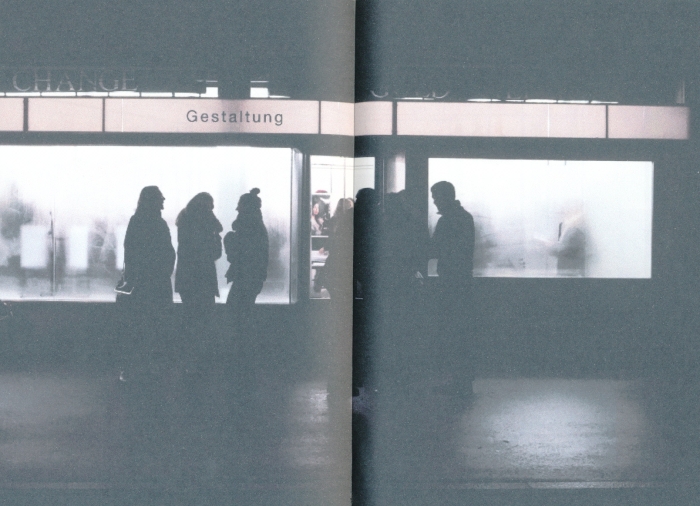smow bookcase: Depot Basel – Display
When in 2013 the design facilitators from Depot Basel were forced to move from their original home in a former grain silo to their current home in a former bureau de change they not only gave up a venue which we once, and not entirely positively, declared as the “picture perfect location for a contemporary design gallery“, they also gave up some 90% of their space: 800 sqm becoming just 65.
What they however gained was display windows. Lots of display windows. And the question of how best to utilise said windows.
Yes, as an extension of the exhibition space and as a continuation of Depot Basel’s mission to mediate design and design thinking to as wide a public as possible.
But how can Depot Basel best use their windows to achieve that?
Commercial galleries who are selling the objects they display have windows as any shop does.
Galleries who understand themselves more as museums rarely have windows. And if they do they are generally blacked out and used solely to present posters advertising what one can view inside. Again, much like a shop window; the “goods” for sale being a visit to an exhibition rather than apples, oranges or an art deco lamp.
Yet as Depot Basel note, “where the purpose of the shopping window is to lure the consumer to wanting to purchase certain items, the designer or artist display has a different agenda that doesn’t necessarily want to connect to the viewers own personal desires and needs, but rather create a tension that will demand the viewer to reflect on what he or she is looking at.”
But, and at the risk of repeating ourselves, how best to achieve that?
Being Depot Basel rather than simply having a team meeting and coming to a collective decision they created a project out of the question, developed a multi-disciplinary, participatory process that goes beyond the windows in question and explores in depth and detail the concept of “displaying”
Under the title “Display” the past two months have seen the collective organise a series of events, workshops and exhibitions, and a project which, at least formally, comes to a close on February 12th with the presentation of the book “Display”
Created by the graphic designers Christophe Clarijs, Kasper Pyndt, Timo Demollin and Kaja Kusztra in co-operation with Depot Basel co-founder Matylda Krzykowski, Display contains essays, photographs, illustrations and deliberations on various aspects of “displaying” – be that commercial, museal, public, institutional, informative, deliberate or accidental.
Short essays on, for example, the history of the billboard or the joys of waiting for your baggage at the airport are mixed with analyses of various display strategies and documentation of the events held at Depot Basel as part of the Display programme including the contribution from Basel collective TEOK and the workshop hosted by The Farm.
In an otherwise excellent book what we find a bit unfortunate is that Display makes no mention of the exhibition Okolo Offline, an exhibition which premièred in Depot Basel, including the Depot Basel windows, and which then continued in an extended form to the Kunstgewerbemuseum Dresden as Okolo Offline Two. For although not officially part of the Display programme, in addition to its primary focus on collecting Okolo Offline also explored displaying and thus would have provided another, not uninteresting, perspective on the discourse.
Although in no way a “how to” guide, Display can in many ways be read as an instruction manual for observers. On the one hand it elucidates how those who organise displays try to guide and/or manipulate us, on the other it makes very clear that we are all responsible for the way we perceive, understand and respond to a display and/or displayed object.
And thus that the success, or otherwise, of a display is a direct result of the balance achieved between these, at times, contradictory positions: What have I understood versus Have they understood what they are supposed to.
In a commercial context you must be convinced to consume.
In an informative context you must understand what you have to do, what not to do or where you have to go.
In an exhibition context you must….
Which of course brings us back to the crux of the problem, the raison d’etre for project and book and a topic delightfully handled in a conversation between Maria Jeglinska, Klara Czerniewska and Matylda Krzykowski.
It goes without saying that Display doesn’t provide any answers. But then it can’t. There is no answer. There is only an understanding of how one can best arrive at the best, most appropriate answer. Display lays down a framework to help you understand such in an entertaining, accessible and at times pleasingly abstract fashion.
Available in limited edition of just 100, we suspect Display will sell out very soon. If it hasn’t already.
However, knowing Depot Basel as we do we’re sure they’ll have a plan…..
Full details on Display and Depot Basel can be found at http://depotbasel.ch
Tagged with: Basel, DEPOT BASEL, display
